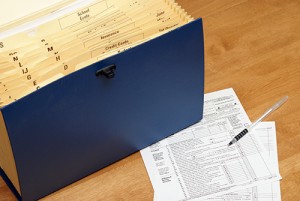
After we form an LLC for your business the next steps are to:
1. Open the New LLC business checking account using the LLC Certificate of Organization and the EIN. When you open the business bank account get the following:
- Just put your LLC name on the business checks not your address;
- Put “Void After 60 Days” under the dollar line on the checks and begin with number 1001;
- Get overdraft protection for your business account;
- Get your monthly statements and check imagines in the mail or print them out or save them every month to your computer or server.
- Get copy of your signature card. (Per Uniform Commercial Code Article 3)
- Get a business debit card that you can use to make business purchases or take draws.
2. Then fill in a W-9 with your LLC name and EIN and give it any one that paid you over $600 so they do not issue you a 1099-Misc. under your SSN for the current tax year.
3. You should hire a payroll company to pay you once per month and set up direct deposit and pay yourself at least $12,000 in 2013 so you can maximize your Simple IRA employee contribution for 2013. I would recommend Ryan Russell of Precise Payroll at 302-530-8410.
4. To maximize your retirement you have until October 1 to open a Simple IRA and then you have until April 15, of the following year to make a $12,000 employee contribution and your LLC can make a 3% of your pay employer contribution. If you can afford to, you should also fund a ROTH IRA or a nondeductible IRA by contributing $5,500 by April 15, of the following year assuming you met the AGI limits. If you can afford to make additional contributions for retirement I can recommend a financial planner.
5. Instead of a Simple IRA you can also consider a 401K and make an employee contribution of $17,500 and have your employer match 10% of that.
6. You should get the following insurance under your new LLC’s name:
- You should get the preferred group health insurance.
- You should also get business professional liability insurance and workman’s compensation if you have employees.
- You should also register your business vehicle registration in your LLC’s name and inform your auto insurer to update your policy and add full tort coverage.
- You should also get a personal umbrella of at least $ 1,000,000 if not more depending on your personal net worth.
- You should also get disability insurance and pay the premiums out of your personal bank account so if you have to file a claim the proceeds will be tax free. I would recommend Tim Harris of Nationwide at 610-565-1910 for auto, business, umbrella and disability.
7. You should sign up for a business visa or master card that either pays you cash back or pays you rewards like Pentagon Federal Credit Union 800-247-5626, or Chase Ink 800-882-6751. You should use the card to make all your business purchases so when you receive the yearend detailed statement that will list all your business expenses by category, it will simplify your record keeping and maximize your tax deductions.
8. You should use Microsoft Outlook or Google Calendars to schedule your appointments and track your mileage and cash expenses. Also keep receipts for cash expenses that you can total at year end.
9. If you want to accept credit cards using your smart phone sign up for Intuit Go Payment at 888-486-9795, which has no monthly fees and charges about 3% per transaction.
10. If you hire someone else to reconcile your bank statements and or make deposits make sure they are bonded to prevent fraud. You should also review your annual profit and loss statement and tax returns with your tax preparer looking for any unusual increases in expenses. Finally you should review the cancelled checks every month from the business account to ensure there are no missing checks or suspicious transactions.
11. If you rent or own commercial space consider switching to Direct Energy at 888-734-0741, which will charge you a fixed rate of 8.79 cents per kWh for electricity which includes transmission charges and gross receipts tax.
12. If you pay anyone who is not a corporation more than $600 during the tax year get them to fill in a W-9, before you pay them so can issue them a 1099-Misc.
By doing all the above steps you will follow the three rules that every entrepreneur has which are to:
- Pay the least amount of taxes legally by following rules 2 and 3 below;
- Maximize your retirement contributions by fully funding both a Simple and Roth or nondeductible IRA;
- Practice good corporate governance by not paying personal expenses from the business checking account and keeping good business records and using your business credit cards for all your business purchases. Making sure you have the proper amount of insurance listed in paragraph 6 above.
Feel free to contact Gregory Spadea at Spadea & Associates, LLC in Folsom at 610-521-0604 if you have any questions.













